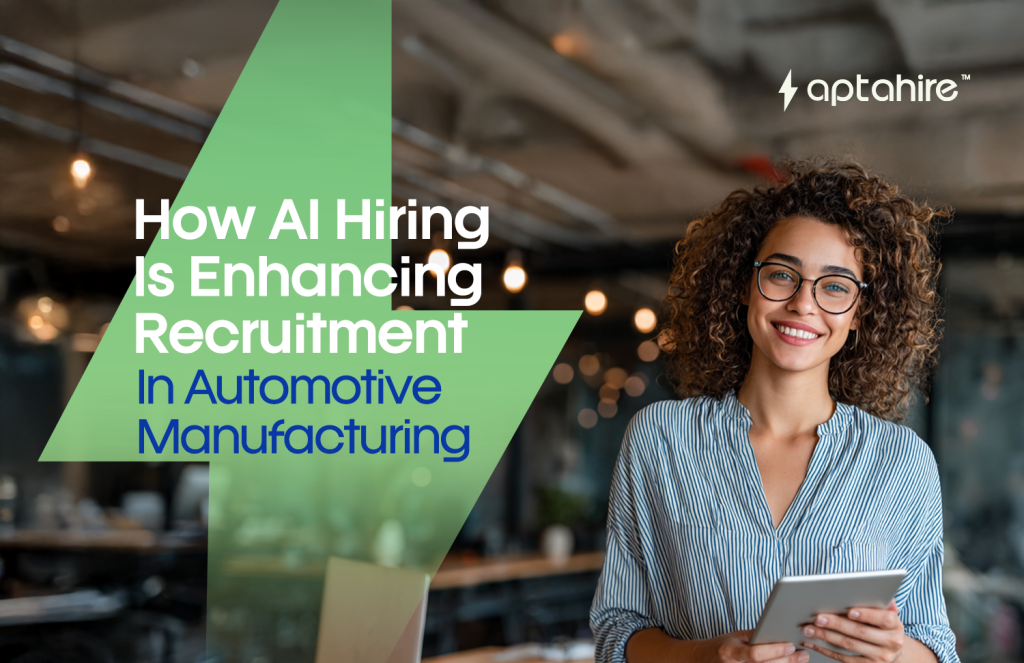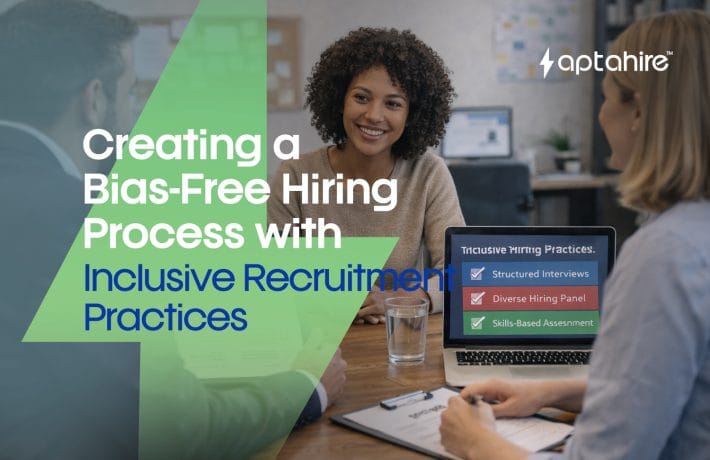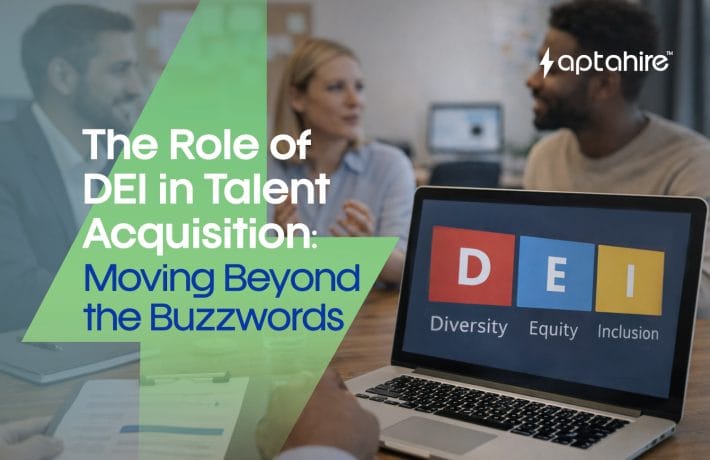How AI Hiring is Enhancing Recruitment in Automotive Manufacturing

The automotive manufacturing industry is going through a massive transformation.
From smart factories to EV innovations, the shift toward Industry 4.0 is revolutionizing how vehicles are built. But there’s one critical piece that often gets overlooked: the workforce behind the machines.
As demand grows for highly skilled, tech-savvy, and safety-conscious employees, AI-powered hiring tools are stepping in to make recruitment faster, smarter, and more accurate.
Let’s explore how AI is enhancing hiring in the automotive manufacturing industry, and why now is the time to adopt it.
1. Understanding the Hiring Landscape in Automotive Manufacturing
Hiring in this industry is unique and complex.
You’re not just looking for engineers and floor operators, you’re looking for people who can:
- Adapt to robotic systems and automation
- Follow safety protocols with precision
- Meet production deadlines under pressure
- Be cross-functional across roles and shifts
Challenges manufacturers face in hiring:
- Shortage of skilled labor (especially in EV tech and robotics)
- High turnover in factory roles
- Geographically scattered plants
- Outdated hiring systems not suited for scale
That’s where AI hiring platforms become mission-critical.
2. How AI Is Changing the Game in Auto Manufacturing Hiring
Let’s break it down with real-world applications of AI in recruitment:
1. Automated Screening for Skilled Roles
AI scans thousands of resumes instantly and filters candidates based on:
- Technical skills (CAD, robotics, CNC, PLC, etc.)
- Certifications (Six Sigma, ISO standards, safety protocols)
- Past work experience in assembly lines, welding, logistics
No more manually digging through stacks of CVs.
2. AI Video Interviews with Skill & Behavior Analysis
Candidates answer questions on camera. AI analyzes:
- Communication clarity
- Problem-solving ability
- Stress response
- Integrity and attention to detail
It flags potential safety risks or mismatches before they hit the factory floor.
3. Geo-Intelligent Hiring
AI tools filter candidates based on proximity to manufacturing plants or willingness to relocate. This helps reduce absenteeism and long-term attrition.
4. Technical Assessments
For engineers, AI integrates with coding tests, mechanical simulations, or aptitude tools to evaluate:
- Mechatronics understanding
- Circuit design
- Vehicle dynamics knowledge
- EV systems proficiency
All evaluated without a human interviewer.
3. Insights, Stats & Industry Proof
Case Study: Bosch
Bosch uses AI recruitment tools to streamline hiring for its smart manufacturing units. With AI video interviews, they’ve reduced time-to-hire by 45% and improved the quality of technical talent.
Case Study: General Motors
GM implemented AI-based assessments to evaluate behavioral and technical capabilities for their EV plant recruits. Outcome: 36% better retention and improved shift performance.
Data That Speaks Volumes:
- The automotive industry will need to hire 2.1 million skilled workers by 2030, according to McKinsey.
- Companies using AI hiring tools have reduced hiring bias by up to 38%.
- AI cuts time-to-fill from weeks to days, especially for technician and machine operator roles.
4. Why You Can Rely on AI for Automotive Hiring
Hiring for manufacturing isn’t just about volume, it’s about precision, safety, and trust.
AI delivers on this by:
Reducing Human Bias
AI doesn’t discriminate based on gender, background, or appearance. It focuses purely on skills and fit, crucial for promoting diversity in shop-floor roles.
Ensuring Compliance
AI hiring platforms are built with data privacy laws (like GDPR and CCPA) in mind. They also help ensure your process aligns with local labor laws and union regulations.
Predicting On-Job Success
AI uses behavioral cues and historical performance data to predict:
- Will the candidate handle high-pressure environments?
- Are they safety-oriented?
- Will they stay longer than 6 months?
This reduces costly attrition and training downtime.
5. Real-World Benefits: AI Hiring in Action
| Recruitment Challenge | Traditional Hiring | AI Hiring |
| Shortlisting Time | 5–10 days | < 24 hours |
| Assessing Technical Fit | Inconsistent | Automated + Scalable |
| Shift/Location Matching | Manual, error-prone | Geo-targeted |
| Diversity Hiring | Prone to bias | Data-driven & fair |
| Hiring Cost | ₹20K–₹50K per candidate | Reduced by 40–60% |
6. Top Use Cases in Automotive Manufacturing
Assembly Line Operators
AI screens for agility, stamina, basic mechanical aptitude, and attention to detail.
Quality Control Inspectors
Candidates are assessed on precision, alertness, and visual judgment through simulations and AI feedback.
EV Engineers & Battery Technicians
AI-based technical tests for new-age skills like lithium-ion chemistry, thermal management, and EV drivetrain knowledge.
Maintenance & Machine Technicians
AI evaluates familiarity with machinery, preventive maintenance routines, and safety handling.
Safety & Compliance Officers
AI interviews assess knowledge of OSHA, PPE usage, and emergency response behavior.
7. Frequently Asked Questions (FAQs) :
1. Can AI hire blue-collar workers effectively?
Absolutely. AI tools today support regional languages, mobile interfaces, and voice-enabled assessments for shop-floor roles.
2. What if my plant is in a rural or remote area?
AI helps geo-target candidates from nearby towns, reducing travel hassles and increasing retention.
3. Can AI assess someone’s ability to work in a team or under pressure?
Yes. AI video interviews use sentiment analysis and stress testing models to detect behavioral traits that matter on the factory floor.
8. How to Start Using AI in Automotive Hiring
Getting started is simpler than most assume. Here’s a quick roadmap:
- Choose a hiring platform tailored to industrial/manufacturing role
- Define skill sets and competencies for each job role
- Automate resume filtering and schedule AI interviews
- Train hiring managers on interpreting AI scores
- Monitor metrics like time-to-hire, interview dropouts, and performance post-hiring
Some trusted platforms in this space include Aptahire, X0PA AI, HireVue, and Talview, many of which now offer industry-specific modules.
Final Thoughts: Future-Proof Your Workforce with AI Hiring
The automotive industry is racing toward a future filled with autonomous vehicles, electric motors, and AI-driven production lines. But without the right people in the right roles, even the most high-tech factory falls short.
AI hiring bridges that gap, with speed, intelligence, and accuracy.
Whether you’re ramping up EV production, staffing a new plant, or replacing retiring talent, AI ensures your workforce is ready for tomorrow’s challenges.
FAQs
1. How does AI improve recruiting processes?
AI speeds up hiring by automating resume screening, scheduling interviews, and analyzing candidate behavior. It reduces bias, improves decision-making, and makes recruitment faster and more efficient.
2. How is AI going to benefit the automotive industry?
AI enhances manufacturing with automation, predictive maintenance, and smart logistics. It also improves hiring by quickly identifying skilled workers and matching them to the right roles.
3. How does AI affect the recruitment and selection process?
AI filters candidates, conducts behavioral and skill assessments, and predicts job fit. It helps companies hire faster and more accurately, while reducing human error and bias.
4. What is a common application of AI in the automotive industry?
Predictive maintenance is a key use, AI predicts equipment failure before it happens. It’s also used in autonomous driving, factory automation, and hiring skilled labor.
5. What is the future of AI in hiring?
AI will personalize hiring, provide deeper insights, automate end-to-end processes, and promote inclusive, bias-free recruitment, empowering recruiters to focus on strategy and culture.
6. How is AI changing the game for recruiting?
AI makes recruiting faster, fairer, and data-driven. It replaces guesswork with insights, reduces time-to-hire, and ensures consistent candidate evaluations at scale.



